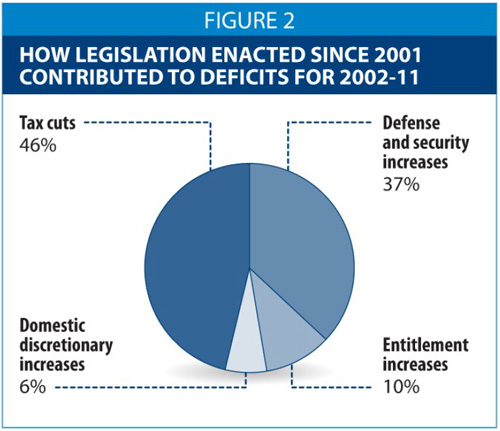Factual Observations of Potential Interest and Relevance
Thu, 09/18/2008 - 06:41 — Rottenchester

Oil is under $100/barrel. Congress did nothing to cause this to happen.
When you have a war and cut taxes, those actions cause a deficit:

(Source: Center for Budget and Policy Priorities)
Comments
Ya gotta help me with this one. I found a letter from the Congressional Budget Office that says tax revenue increased by about 35% from 2003-2006 and was growing even faster in 2007. The revenue was growing at a rate of about 12% per year. That would certainly keep my home budget out of the red. So, at a 12% growth rate how did tax revenues add 46% to our deficit? Seems to me like we must be spending way too much???????
http://www.cbo.gov/ftpdocs/81xx/doc8116/05-18-TaxRevenues.pdf
I read the article and they cite CBO estimates for the basis of their what-ifs, but they don't link to the specific reports, so I can't double-check their math.
That Conrad letter says we took in $1,783b in 2003 and $2407b in 2006. We spent $2,160B in 2003 and $2,655b in 2006, according to this:
http://usgovernmentspending.com/download_gs.php?span=usgs303&year=2006&v...
That doesn't directly address your question, but we did greatly outspend revenues both years.
I got off track, but my original question was how someone can blame 46% of the deficit on tax cuts when tax revenue is going up 12% per year?
Because if tax cuts hadn't been enacted, the tax revenue would have gone up a little more than 12% in a year.
Here's some very rough arithmetic:
That report says that between 2001 and now, $1 trillion of deficit can be attributed to tax cuts and budget increases. That means 480 billion can be blamed on tax cuts.
That's an average of 69 billion a year. (480/7 = 69)
The CBO report you quoted said we took in 1.7 trillion in taxes in '03, and 2.4 trillion in '06. That's an average of about 2.1 trillion in revenue.
69 billion is 3% of 2.1 trillion.
So, instead of 12%, if we had a 15% increase in revenue each year, and had not gone over budget on the war, we'd have a tiny deficit right now.
That doesn't sound so crazy.
(I know that doing averages aren't the right way to figure out the problem, but I'm just trying to see if we are even in the ballpark of something that makes sense.)
So, we increased expenses, but did not increase revenues enough. It makes a little sense now. Still seems odd that we can increase revenues by 12% per year and still be digging a deeper hole.
Your table reads that total government spending is at 36% of GNP. To me that is very scary
I agree -- it's a big number, and since we're not paying for it all, our kids will be.
Tax cuts have turned into this big partisan issue, but my one hopefully non-partisan observation is that tax cuts need to be coupled with pay-as-you-go legislation. It's too damn easy for politicians to vote for tax cuts if they can still vote for every single program their constituents might like.
I hope that number one in Obama's three-point plan will be increasing taxes on the ones that most people hold responsible for this situation -- the wealthy and the powerful top 2%.
I saw someone remark, as a joke, that there should be a special tax levy for top execs at Wall Street firms that got major gov't infusions, e.g., Bear-Stearns and AIG. Or even any firm that traded in a significant amount of mortgage-backed securities.
I think we ought to take that suggestion seriously.
Right, the Administration solution, as usual, is to throw money at the problem. As we've seen from the war, Katrina, etc., it tends to trickle down to friends of the Administration. The temporary ban on short selling is the only evidence of restraint that I've seen so far.,
I think government spending needs to be cut. Everyone seems to complain that companies are taking jobs out of New York and out of the country and who can blame them for trying to avoid such high taxes.
Problem is that we've promised so many people so many things.
Our new investments in banks, brokerage firms and insurance companies will, I'm sure, help to wipe out our deficit. Eddie Sutton was right when he said that banks are where the money is. Now though, it's up to middle class Americans, and the Chinese, to stock the vaults. It's like having a 401K, or privatized social security, for all of us.
Yeah, between AIG and Bear-Stearns, we're all set.